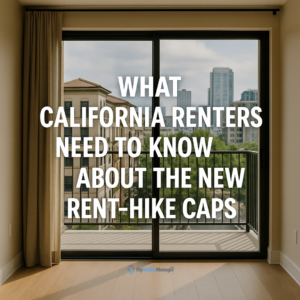California continues to strengthen its tenant protection laws amid ongoing housing affordability challenges. Attorney General Rob Bonta recently issued a consumer alert reminding landlords and renters alike of the new caps on annual rent increases set by the Tenant Protection Act (TPA), also known as Assembly Bill 1482.
The updated cap is intended to prevent sudden, excessive rent hikes that could displace renters or make housing increasingly unaffordable. The TPA applies to most multi-family rental units across California, particularly those built more than 15 years ago, while also leaving room for cities with stricter rent-control laws to maintain their own limits.
What the New Rent Cap Means
Under the Tenant Protection Act, landlords cannot increase rent by more than 5% plus the regional change in the Consumer Price Index (CPI), or 10% total whichever is lower.
This formula is reviewed and recalculated annually based on the local CPI rate. The cap applies to all rent increases that take effect between August 1, 2024, and July 31, 2025.
For example:
-
In San Diego County, the current CPI change is 3.6%, meaning landlords may not raise rent by more than 8.6% total (5% + 3.6%) during this period.
-
If inflation rises next year, the allowable percentage may adjust but it will still be capped at 10%.
This rule ensures that rents remain predictable and within reason, providing tenants with stability while allowing landlords to adjust gradually for market conditions.
Who Is Covered by the Law
Most rental housing in California falls under the TPA, including:
-
Apartments and multi-unit properties built before 2009 (as of 2024).
-
Condominiums and single-family homes owned by corporations, LLCs, or institutional investors.
-
Mobile home parks and Section 8 housing, if not otherwise exempt.
The law is meant to cover the vast majority of California’s rental housing stock that does not fall under local rent control. However, not all properties are subject to these limits.
Exemptions from the Rent Cap
Certain types of housing are not covered under the Tenant Protection Act. These include:
-
Single-family homes or condos owned by individuals (not corporations or LLCs), provided the owner gives proper written notice of the exemption.
-
Units built within the last 15 years, calculated from the date of the certificate of occupancy.
-
Owner-occupied duplexes where one of the units is the landlord’s primary residence.
-
Government-subsidized housing already subject to separate federal or local rent regulations.
Landlords must understand these distinctions, as misapplying the exemption could expose them to penalties, tenant claims, and potential litigation.
What Tenants Should Do
Attorney General Bonta’s alert encourages tenants to be proactive in protecting their rights. Here’s what renters should do if they receive a rent increase notice:
-
Verify Coverage: Determine whether your unit falls under the TPA or a local rent-control ordinance. Most tenants can contact their local housing authority for confirmation.
-
Ask for Justification: Request written documentation showing how the landlord calculated the CPI adjustment and total increase.
-
Know Your Rights: If your landlord raises rent beyond the legal limit, you can seek assistance through local legal aid or file a complaint with the California Department of Justice’s Housing Strike Force.
-
Understand Retaliation Protections: Landlords cannot retaliate against tenants who question or report unlawful rent increases.
Starting April 1, 2024, tenants gained additional legal remedies, including the ability to seek actual and punitive damages, plus attorney’s fees, for unlawful rent increases.
What Landlords Need to Know
For landlords, compliance is key. Misunderstanding the rent cap could result in serious consequences, including financial penalties and legal disputes.
Here’s what every landlord should keep in mind:
-
The rent increase cap applies to any 12-month period, not just calendar years.
-
Multiple rent increases within the same year cannot exceed the total allowable cap.
-
Local jurisdictions (like Los Angeles, San Francisco, and Berkeley) may impose stricter rent-control laws, which override state limits.
-
Rent increase notices must be delivered in writing, with proper notice periods typically 30 days for increases under 10% and 90 days for increases of 10% or more (if permitted).
Landlords are also encouraged to document CPI calculations, retain records of prior rent levels, and consult local regulations before adjusting rents.
Impact on California’s Rental Market
California’s rent caps are part of a broader strategy to stabilize the housing market while the state continues to face chronic housing shortages.
-
According to recent reports, more than 50% of California renters are cost-burdened, spending over 30% of their income on rent.
-
The state’s goal is to balance tenant protections with landlord sustainability, ensuring long-term housing security without discouraging property investment.
-
The new rent cap provides predictability, reducing disputes and promoting transparency between property owners and tenants.
For property managers and onsite managers, understanding these regulations is crucial to maintaining legal compliance, tenant trust, and operational efficiency.
Key Takeaways
| Stakeholder | What to Remember |
|---|---|
| Renters | Your annual rent increase cannot exceed 5% + CPI (or 10%). Verify if your property is covered by the TPA or local law. |
| Landlords | Keep documentation of CPI rates, prior rents, and exemption status. Always issue increases in writing with the correct notice period. |
| Property Managers | Monitor CPI updates each July, align internal lease templates with state law, and communicate changes clearly to tenants. |
Looking Ahead
The current rent-cap period (August 1, 2024 – July 31, 2025) will remain in effect until new CPI data prompts an updated limit next year. As housing costs evolve, California lawmakers are expected to revisit the Tenant Protection Act to further refine renter safeguards and enforcement measures.
Whether you’re a tenant, landlord, or property manager, staying informed about these regulations is critical. Attorney General Bonta’s renewed alert serves as a reminder: rent fairness isn’t just good policy it’s the law.
Source: “Bonta alerts California renters to new caps on rent hikes” – Fox5 San Diego

